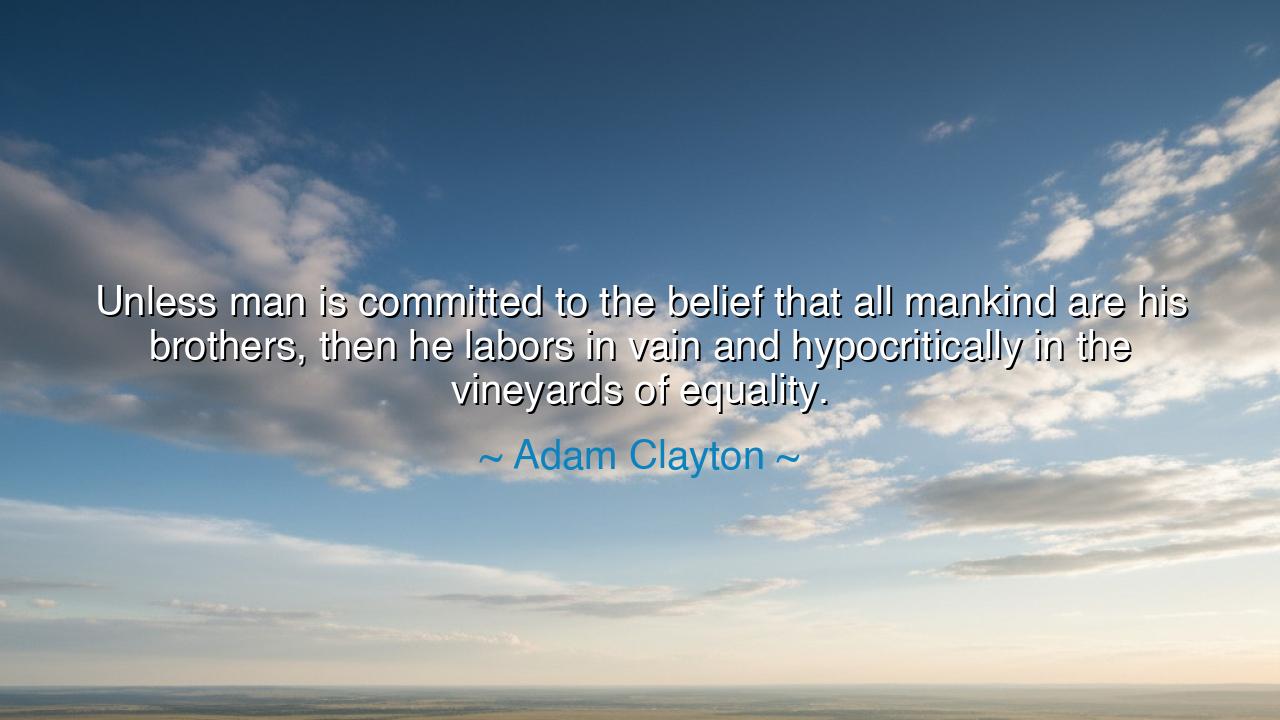
Unless man is committed to the belief that all mankind are his
Unless man is committed to the belief that all mankind are his brothers, then he labors in vain and hypocritically in the vineyards of equality.






“Unless man is committed to the belief that all mankind are his brothers, then he labors in vain and hypocritically in the vineyards of equality.” These are the words of Adam Clayton Powell Jr., a man who walked in the fire of the American civil rights movement and spoke with the authority of both preacher and statesman. In his time, as in ours, many cried out for equality, yet few understood the price of it — not in law or policy, but in the heart. Powell’s words burn like scripture, reminding us that equality without brotherhood is a hollow dream, and that the pursuit of justice without compassion is but a mask for pride. He teaches that no system, no legislation, no speech can make men equal unless they first see one another as kin beneath the same sun.
In this saying, Powell speaks as one who had seen hypocrisy in action — those who spoke of freedom, yet despised their neighbor; those who proclaimed equality, yet clung to privilege. To labor in the vineyards of equality without love is to tend the vines but drink no wine. The vineyard, in his metaphor, is the world of moral and social labor — where men plant laws, movements, and reforms. But if the workers do not see one another as brothers, their harvest turns to ashes. Equality is not merely an arrangement of rights; it is the flowering of the soul’s recognition that the blood of one is the blood of all. Without that inner transformation, all external progress is illusion.
The origin of Powell’s conviction was not found in theory, but in struggle. Born in 1908, a minister’s son who would one day lead Harlem’s Abyssinian Baptist Church, he rose to become the first African American from New York elected to Congress. There, he fought for civil rights, education, and economic opportunity for the oppressed. Yet even amid victory, he saw a danger: that men might fight for equality as a slogan, but not as a sacred duty. His words were a warning — that to seek justice without fraternity is to build palaces upon sand. The vineyards of equality, tended without love, yield bitterness instead of wine.
The ancients understood this truth long before Powell spoke it. The philosopher Seneca, writing in Rome’s age of empire, taught that all men, whether slave or emperor, share the same breath of life and must therefore treat one another with reverence. Centuries later, Jesus of Nazareth gave voice to the same commandment: “Love thy neighbor as thyself.” But how easily man forgets this eternal law. How swiftly he divides himself by color, creed, and fortune — calling his brother “other,” and thereby making equality an empty word. Powell, in his time, rekindled that ancient flame, demanding not only laws of fairness but hearts of compassion.
Consider the story of Nelson Mandela, who spent twenty-seven years imprisoned by those who feared the very equality he preached. When at last he emerged into freedom, he could have sought vengeance; instead, he sought reconciliation. “As I walked out the door toward my freedom,” he said, “I knew if I didn’t leave my bitterness behind, I’d still be in prison.” Mandela, like Powell, understood that true equality is born from brotherhood, not hatred. His forgiveness built a bridge stronger than any law could decree, for it was founded upon the spirit of kinship among men.
Powell’s words are both challenge and revelation. They remind us that many will speak of equality when it benefits them, but few will live it when it costs them comfort. Brotherhood demands sacrifice — the willingness to see in another’s suffering a reflection of one’s own. Without that commitment, progress becomes pretense. We cannot heal the world by policies alone; we must mend the heart that made the wound. Equality that is not rooted in love becomes tyranny by another name.
And so, my children, let these words guide your hands and your conscience: do not labor in vain in the vineyards of equality. Plant not the seeds of pride or resentment, but those of compassion and solidarity. Let every act of justice be joined with mercy, every demand for rights be joined with respect. See in every man and woman, no matter how distant or different, the image of your own humanity. Only then will the vineyard bear its true fruit — the wine of peace, shared among brothers at one table. For equality without love is hypocrisy, but equality born of brotherhood is the very harvest of heaven.






AAdministratorAdministrator
Welcome, honored guests. Please leave a comment, we will respond soon